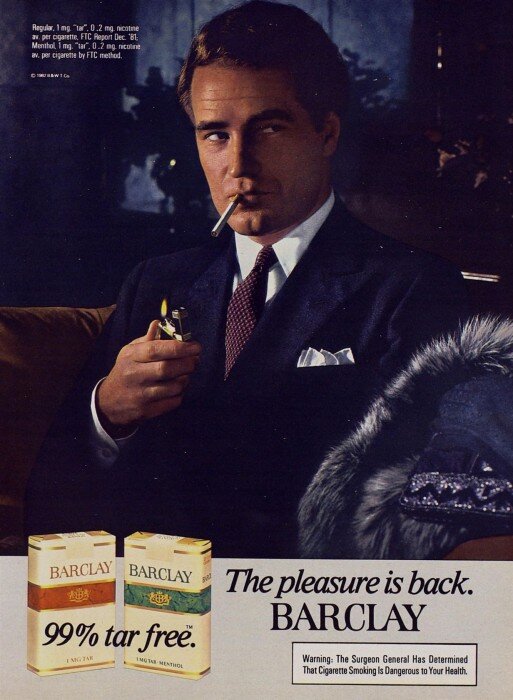
Welcome to the Partisan Advertising blog.
The Partisan Advertising blog has advertising agency-related posts dating back to 2010 covering a vast array of topics.
The simplicity of cigarette advertising
I wonder what it was like, back in the halcyon days of advertising, when advertising agencies created advertising for the tobacco industry?
I wonder what it was like, back in the halcyon days of advertising, when advertising agencies created advertising for the tobacco industry?
Below are some great examples of what I consider to be a forgotten craft of creating simple messages that build brands and sell products. After all, cigarettes are a very bizarre product. Small white tubes, stuffed with dried grass and chemicals, are loved or loathed and consumed in vast numbers.
My father smoked on an irregular basis from his bar area on the other side of the house. I could always smell his lit cigarette from my bedroom. It was an inviting scent – masculine and strong. Whenever I smelt it I knew it was time to join my dad at the bar and listen to his stories and share how our days went. I’m not sure why he smoked but it didn’t bother me much. When my friends started to smoke, the scent of burning tobacco took on another emotion for me. They stank of stupidity and the entire house smelt terrible for days. I wasn’t a fan but that’s the power of marketing for you.
In my opinion, it was the advertising agencies who made these ads that are responsible for the success of the tobacco industry. If you want to know why good advertising is so important to your business, take a look at these ads. These simple advertisements created such a dynamic, emotive response in the reader that it was almost impossible to say no to them, regardless of the side effects.
How much are promises worth?
If you saw an ad for a restaurant and it said “We promise not to spit in your food”, would you be relieved or a little bit worried? Let’s say for instance that Air New Zealand ran an ad campaign and they said “We promise not to crash into the ocean”, would you choose them over another airline?
As consumers, we are entitled to take a few things for granted. Certain professions have an obligation to do the right thing. Assurances of saliva-free food and crash-free journeys shouldn’t have to be made by restaurants and airlines. What the restaurant should be promising is that they make the finest Ossobuco in the world, which is based on a 300-year-old family recipe that is closely guarded by the Mafia. The airline should be promising that they will always be on time, your luggage won’t be lost and that they won’t be retrenching thousands of local staff so they can outsource to Mumbai.
Any fool can make a promise. In fact, Bunnings and Mitre 10 Mega do it all the time with their price promises. However, the reality is they are cheating on the promise. Put simply, you have absolutely no chance of finding the same stocked item anywhere else in the galaxy. Either they’ve negotiated with their suppliers for the best rate or they are the only company that sells that specific product.
Consumers want something remarkable from promises, simply because all the best ones are so hard to keep.
I wonder if the good folk at BNZ Bank know this?
BNZ's latest ad campaign is all about the six promises they’ve made to help you be good with money.
They are:
We promise to listen, and help you make the right choices.
We promise to make things simple, so it’s easy to manage your money and make it grow.
We promise to provide fast, effective service, that’s right the first time.
We promise to recommend products and services that give you the best value.
We promise to be honest and straight up, at all times.
We promise if we stuff up for any reason, we’ll fix it and do right by you.
Does BNZ Bank really have to promise that they will be honest? Maybe I’m missing something but I always thought that banks and honesty should go together like Ken and Barbi. I guess not. And worst of all, their last promise is basically just a way to weasel out of their other five promises. And what exactly do they mean by "do right by you"? Will I get a cake if they stuff up?
What I would have preferred to see would be:
We promise that our investment bankers will not misappropriate your money and spend it on teenage hookers and cocaine in Bangkok
We promise that we will not complain about how hard the banking industry is when we’ve made $700 million dollars in profits in just one year
I could go on and on but the only promise they should make is:
We promise to offer the best interest rates, guaranteed.
Now that’s a remarkable promise, simply because it’s so hard (almost impossible) to keep. I can imagine the ad campaign already.
New Zealand’s Best Brand 2012 - FOUR
There’s something just right about the way FOUR have gone about their branding business this year. Sure, FOUR don’t have as wide a target as the other broadcasters, or as small a market as Rialto or the ARTS channel, but they really do a good job of appealing to their demographic.
There’s something just right about the way FOUR have gone about their branding business this year. Sure, FOUR doesn’t have as wide a target as the other broadcasters, or as small a market as Rialto or the ARTS channel, but they really do a good job of appealing to their demographic.
There’s something of an elegant solution in everything they do. From the way they use the beautiful Gotham font across their network, to their striking colours and their often awful movie choices, there’s not much to fault them with (except that Gotham is the most used font of the past decade). Every detail seems nuanced to the nth degree, which might seem odd based on their young(ish) target market. I guess the sophistication level of the average New Girl and Glee viewer isn’t what many people thought it was. Then again, I’m almost 40 and I’m sure FOUR is one of my most watched channels, just behind the Brainiac Bunch of National Geographic, Discovery Channel and Animal Planet.
Even though FOUR exist in my life at the mercy of the fast forward button, I still enjoy their company. And at the end of the day, that’s really all that matters in the relationship between consumers and their brands.
Merry Christmas!
New Zealand’s Worst Brand - HRV Home Ventilation
The reason for HRV winning New Zealand’s Worst Brand of 2012 has nothing to do with their dodgy sales tactics that came to light late in 2012, but more about how they responded to the allegations. Hundreds of people complained about how bad HRV were, and when hundreds complain you can extrapolate the number of grumpy folk even further due to the lazy, can’t-be-bothered nature of people to voice their frustrations.
The reason for HRV winning New Zealand’s Worst Brand of 2012 has nothing to do with their dodgy sales tactics that came to light late in 2012, but more about how they responded to the allegations. Hundreds of people complained about how bad HRV were, and when hundreds complain you can extrapolate the number of grumpy folks even further due to the lazy, can’t-be-bothered nature of people to voice their frustrations.
When Bruce Gordon, CEO of HRV joined John Campbell live on TV, he humbly claimed that since arriving at the helm he had changed the gung-ho mentality that was rife in his business, and that these reports flowing in about HRV were a thing of the past. At least he was brave enough to appear on TV and try to appease the masses.
The problem was the fire was raging and nothing changed. After Bruce Gordon’s TV appearance, HRV set up a dedicated “No Pressure Hotline” for customers who wanted to discuss a “sales experience or customer experience”. And that was it.
The truth of the matter is that every brand can learn more from the customers who complain then they ever can from the customers who don’t. The first step they should have taken was to take stock of the enormity of the problem and call every single customer they have (surely there must be thousands?) and say “Thank you for being an HRV customer – what are your experiences with HRV?” If the vast majority were negative then HRV knew they were boned. They didn’t do this, and perhaps this is the cynic in me talking, but I think they already knew what the answer would be before the calls were made.
This is why I wasn’t very surprised when I received two calls from HRV in November asking me first if I could recommend a friend for HRV, for which I would be rewarded with a cheap bottle of wine, and second if they could help me heat my house in winter. To both of these, I replied with a polite “Get Fu##ed!”
HRV’s current advertising agency is Y&R. They used to be fairly cool, especially back in the day when Vaughn Davis was in charge of their creativity, but now they’re as limp as month-old celery. I have no idea what they proposed to HRV to help them put out the fire but if they think they can carry on fighting their sentimental hogwash of a sixty-second ad and things will go away, then they may just be wrong.
But I doubt it. Consumers are very forgetful and we tend to forget the injustices of the past. So I can only predict that HRV will remain fairly well-off after this debacle and that Y&R will continue to be their agency for a year or so before the “new broom” sweeps them out the door and HRV appoint some other indistinguishable agency to the role.
All in all, HRV is still the winner of New Zealand’s Worst Brand 2012. Merry Christmas!















